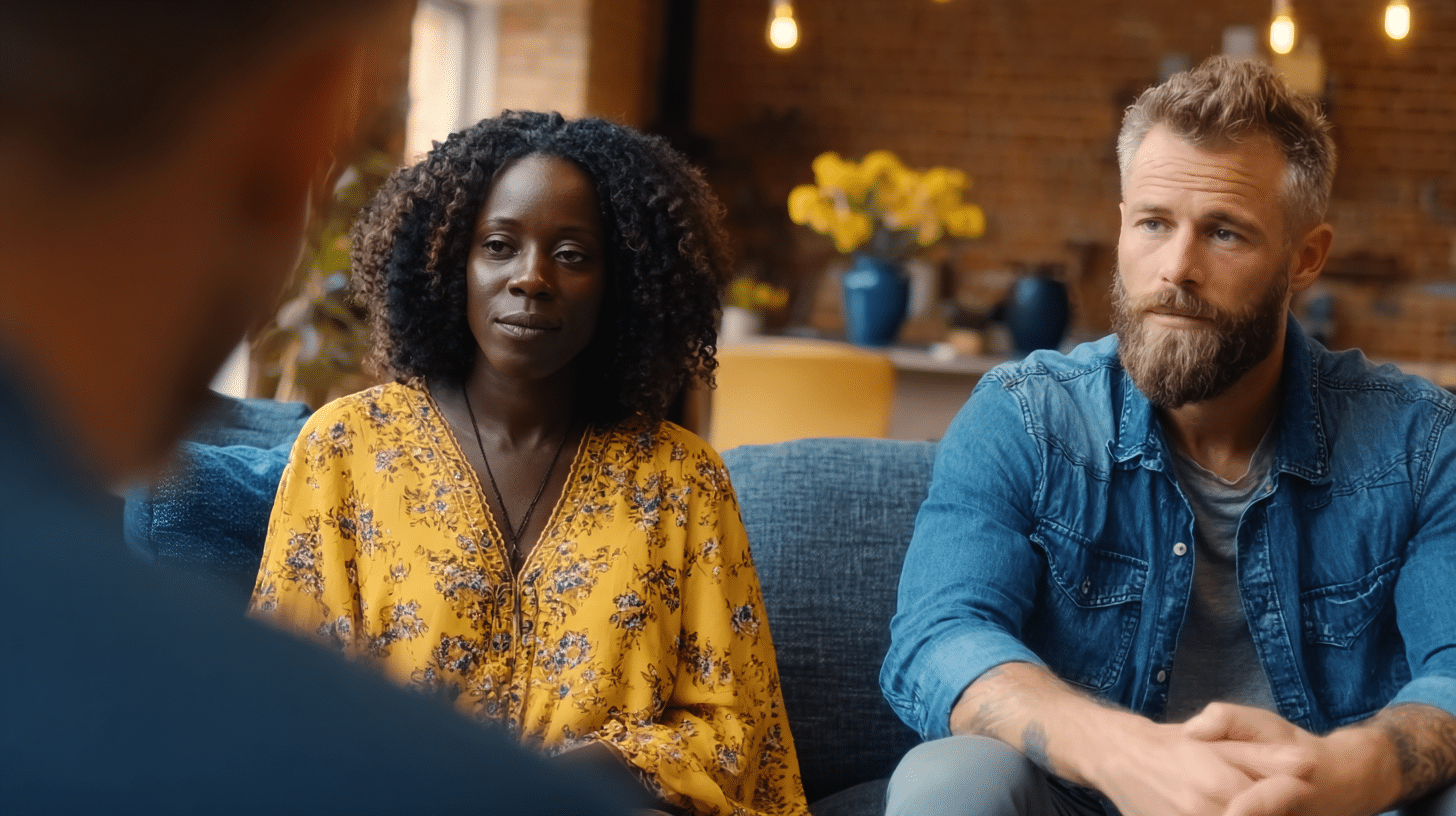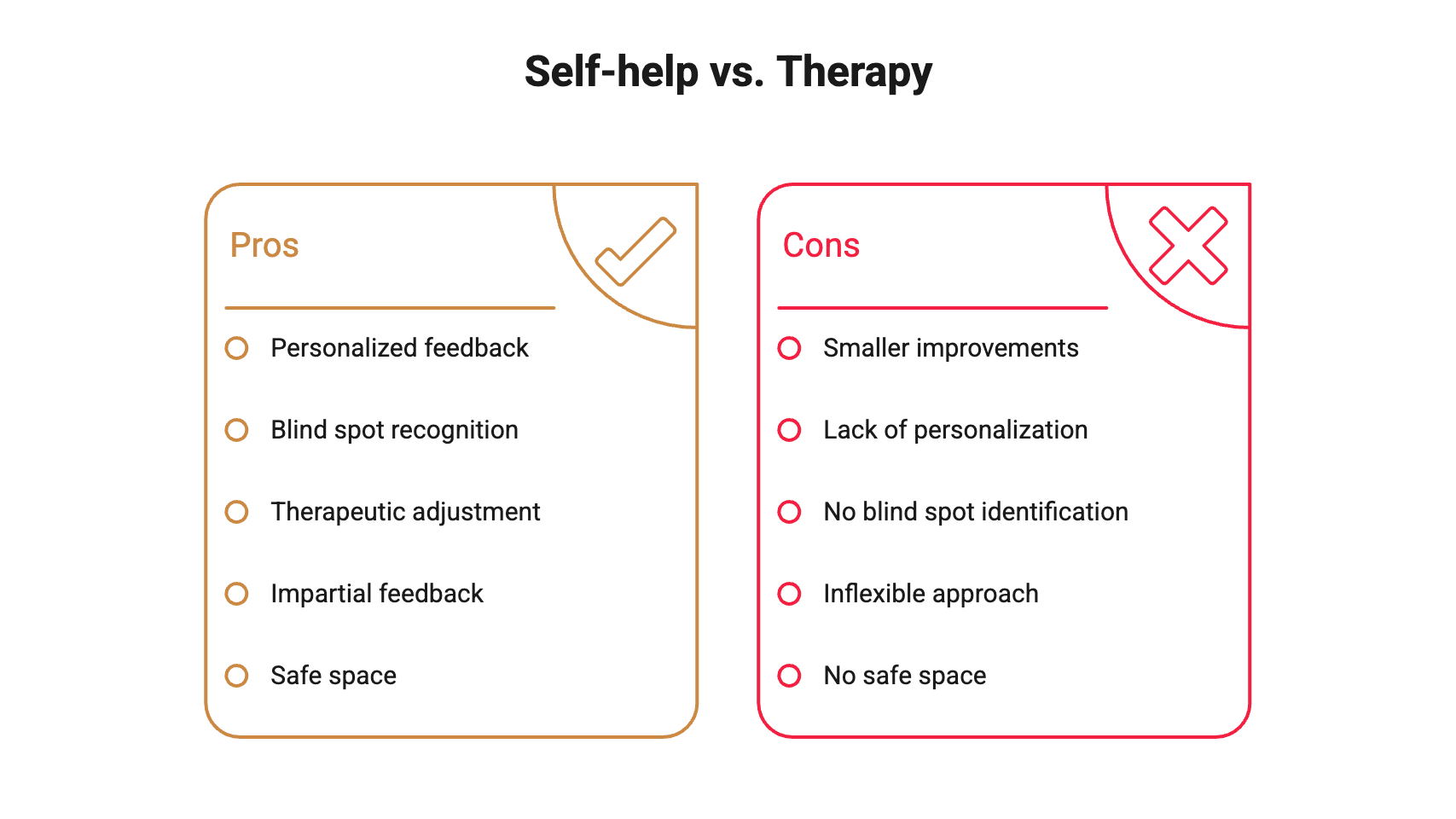Do We Need Marriage Counseling, or Can We Fix This Ourselves?
Last updated: November 2025
You’ve read the books, listened to the podcasts, and tried the communication techniques—but your relationship still feels stuck. Marriage counseling works when self-help approaches fall short, offering personalized guidance that addresses your specific relationship patterns with proven effectiveness rates of 60-80% for distressed couples. While self-help programs can improve mild relationship issues, research shows professional couples therapy leads to larger and longer-lasting improvements in relationship satisfaction and communication, especially when problems have become entrenched.
What is the success rate of couples counselling?
About 70-80% of couples report significant improvement by the end of treatment, making couples therapy effectiveness among the highest for any mental health services. Studies indicate that 60-80% of distressed couples benefit, with gains often lasting months or years after treatment ends. Research comparing couples therapy to other psychological interventions shows similarly strong outcomes across different treatment approaches.
The most researched approaches—emotionally focused therapy and behavioral marital therapy—show particularly strong outcomes. Marriage and family therapists trained in these evidence-based methods help couples develop communication skills and resolve conflicts that might otherwise lead to separation. Emotionally focused couple therapy demonstrates substantial effectiveness for most couples who complete treatment, while the Gottman method therapy offers structured techniques for building friendship and managing disagreements through the Sound Relationship House Theory.
Timing makes the difference. Many couples wait several years after relationship issues arise before seeking help, which can reduce therapy effectiveness. Couples who begin marriage counseling early, before dysfunctional relationship patterns become deeply entrenched, see better outcomes than those who wait until considering divorce.
Client satisfaction with marriage and family therapy is consistently high, with couples reporting marked improvement in overall health and relationship functioning after treatment. Marriage and family therapists provide a substantial portion of relationship-focused mental health services, reflecting both the prevalence of relationship distress and the effectiveness of these interventions.
In our practice at Therapy Group of DC, we regularly see couples who wish they’d started therapy sooner. The patterns that took years to develop don’t disappear overnight, but we consistently observe meaningful shifts within the first few sessions when both partners commit to the therapeutic process. Early intervention truly makes a difference.
How effective are different types of couples therapy?
Not all marriage counseling works equally well. Emotion focused therapy and integrative systemic therapy have the strongest research backing, with emotionally focused couples therapy showing effectiveness for the majority of couples who fully engage in treatment. These therapeutic approaches focus on improving emotional connection and helping partners understand their relationship dynamics.
Marriage and family therapists use various techniques depending on your specific challenges. Therapeutic techniques can include active listening, empathy training, and conflict management strategies tailored to your situation. Some couples benefit from weekly sessions focused on communication patterns, while others need help with relationship distress stemming from external stressors like parenting conflicts or financial strain. Your couples therapist will develop a treatment plan tailored to your unique situation, typically involving around 12 sessions to address underlying issues effectively.
Is couples therapy actually effective compared to self-help?
Professional couples therapy generally leads to larger improvements than self-help programs, particularly for couples with serious or long-standing relationship challenges. While books, online therapy platforms, and relationship education courses can help mild relationship issues, couples therapy produces more substantial results than self-directed approaches for most distressed relationships.
What research shows about self-help programs
Self-help programs do have their place. Online programs like OurRelationship improve relationship satisfaction and communication skills for some couples, especially those with less severe problems or who have trouble accessing in-person mental health services. These digital relationship education programs can lead to meaningful improvements, with benefits lasting up to a year for couples who complete them.
However, the improvements from self-help tools are typically smaller than those seen with traditional marriage and family therapy. A couples counselor provides personalized feedback, helps you recognize blind spots in your relationship patterns, and adjusts the therapeutic process based on your specific dynamics—advantages that books and apps simply cannot match. The presence of a neutral third party provides impartial feedback beneficial for both partners and creates a safe space for vulnerability that self-help cannot replicate.
When self-help works—and when it doesn’t
Self-help approaches work best for couples dealing with:
- Minor communication gaps
- Strengthening an already stable relationship
- Seeking relationship education as a preventive measure
These relationship education courses and online therapy options offer flexibility and privacy at a lower cost than traditional couples counseling. Couples therapy can also be conducted through teletherapy, offering flexibility in accessing mental health support.
But self-help programs struggle with deeper relationship issues. If you’re dealing with emotional disconnection, betrayed trust after infidelity, or considering separation, you need the expertise of a licensed therapist who can navigate complex emotional territory. Mental health professionals trained in family therapy understand how to treat mental and emotional disorders that may be affecting your couple relationship, something self-help materials cannot address. When one partner is reluctant to engage, therapists are trained to address fears or misconceptions that prevent full participation.
The question isn’t just “can we fix this ourselves?”—it’s “what will we lose by waiting?” Extended delays in seeking marriage counseling allow negative communication patterns to calcify, resentment to build, and emotional connection to fade. Individual therapy may help one partner process personal issues, and partners sometimes engage in individual therapy alongside couples therapy to work through personal dynamics impacting the relationship. But relationship challenges require both people working together with a skilled therapist.
We often work with high-achieving couples in Dupont Circle who initially resisted couples therapy, viewing it as admission of failure. Once they start, they frequently tell us they wish they hadn’t waited so long. The tools we teach aren’t available in books because they need to be calibrated to your specific relationship dynamics and adjusted as you grow.
What is the 7 7 7 rule for couples?
The 7-7-7 rule suggests couples should go on a date every 7 days, take a weekend getaway every 7 weeks, and plan a week-long vacation every 7 months. While this guideline emphasizes the importance of quality time together, research on couples therapy effectiveness shows that structured relationship education and professional support produce more reliable improvements than scheduling formulas alone.
Marriage and family therapists recognize that regular connection matters, but they also understand that couples with deeper relationship distress need more than date nights. A couples counselor can help you identify whether time together will strengthen your bond or whether you first need to address communication patterns, resolve conflicts about parenting or finances, or rebuild trust after betrayal. Therapy can offer support for navigating major life transitions such as having children or managing finances.
The therapeutic approaches used in marriage counseling work by helping partners develop relationship skills that extend beyond scheduled activities. Family therapists teach active participation in each other’s emotional lives, mutual respect practices, and techniques for maintaining emotional connection during stressful periods. These skills create a strong foundation that supports your relationship even when life prevents perfect adherence to scheduling rules.
What is the 5 5 5 rule for couples?
The 5-5-5 rule recommends spending 5 minutes of uninterrupted conversation daily, 5 hours of quality time weekly, and 5 days away together annually. Like the 7-7-7 rule, it highlights connection but doesn’t address the underlying relationship issues that bring couples to therapy.
If following time-based rules improved troubled relationships reliably, marriage and family therapists would simply prescribe schedules. Instead, couples therapists assess your specific relationship challenges—whether you struggle with one partner’s reluctance to engage emotionally, communication breakdowns that escalate into fights, or difficulty balancing individual needs with couple relationship needs.
Treatment plans in family therapy address these specific patterns. Marriage counseling works by identifying what prevents you from connecting authentically during the time you do spend together. A skilled therapist helps you understand your communication patterns, recognize when you’re stuck in negative cycles, and develop new ways of responding to each other that build intimacy rather than resentment. Assessment of relationship dynamics is a crucial first step in couples therapy to tailor the treatment plan appropriately.
For couples dealing with serious relationship distress, substance abuse issues, mental health concerns, or the aftermath of infidelity, structured time together may feel forced without professional guidance. Research on family process shows that higher relationship satisfaction comes from the quality of emotional attunement between partners, not just clock hours logged together.
In our clinical practice, we see couples who’ve tried every scheduling trick and self-help strategy before coming to therapy. They’re often surprised that marriage counseling focuses less on time management and more on helping them truly hear each other, manage conflict productively, and rebuild the emotional safety that makes quality time meaningful.
Making the decision: Professional help or self-help?
When to choose professional couples therapy
Choose professional marriage counseling if you’re experiencing:
- Serious relationship challenges or long-standing patterns
- Feeling stuck despite your best efforts to improve things
- Considering separation or divorce
- Relationship distress affecting your physical health or mental well-being
- Issues involving substance abuse, infidelity, or family systems conflicts
Couples therapy with trained marriage and family therapists offers personalized support that self-help simply cannot replicate. Marriage and family therapists need a master’s or doctoral degree in marriage and family therapy or a related field, along with supervised clinical experience. Therapists adopt various roles—advisor, coach, facilitator, or educator—depending on what your relationship needs most. This professional expertise is particularly valuable when relationship distress impacts multiple areas of your life.
When self-help might be enough
Consider self-help approaches for minor communication issues, relationship enrichment when things are generally positive, or as a starting point if cost or scheduling makes couples counseling difficult right now. Online therapy platforms and relationship education programs can provide useful tools and may be sufficient for couples with mild concerns.
But don’t let “we should be able to figure this out ourselves” become the reason you wait several more years. Research consistently shows earlier intervention produces better outcomes, and the skills you learn from a couples therapist create positive outcomes that benefit not just your romantic relationship but your broader family process and individual well-being.
The DIY mentality serves us well in many areas of life. But when it comes to intimate relationships, sometimes the most capable, intelligent couples need an objective mental health professional to help them see patterns they’re too close to recognize. That’s not failure—that’s wisdom.
Getting started with couples therapy
If you and your partner are struggling with persistent relationship issues, our experienced marriage and family therapists at Therapy Group of DC can help. We work with couples at all stages—from those addressing early concerns to those rebuilding after serious challenges. Schedule an appointment to discuss whether couples therapy might be right for you.
Disclaimer: This article is for informational and educational purposes only and should not be considered a substitute for professional medical or mental health advice, diagnosis, or treatment. If you or someone you know is experiencing relationship distress, domestic violence, or mental health concerns, please consult with a qualified mental health professional or contact emergency services if immediate help is needed.


